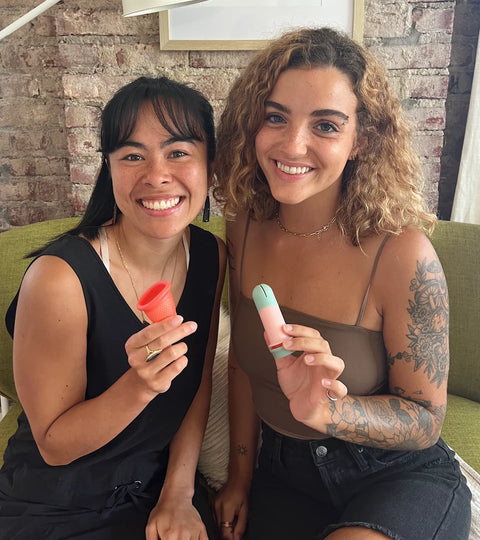Celebrating Sunny’s Women Owners
Written by Cinestie Olson
October isn’t just about celebrating Halloween and fall festivities, it's also National Women’s Small Business Month! In case you haven’t heard, Sunny’s very own co-founders, Cindy Belardo and Drew Jarvis, are proud members of this community! We look forward to a month of highlighting our founders as well as uplifting other women small business owners and their achievements! What better way to celebrate this month than to interview our co-founders?
Q: What does it mean to you to be a woman with a small business?
Drew: The world of period care, and business in general, has historically severely lacked gender representation and female voices. Being a woman with a small business means we get the chance to advocate for, provide a platform for, and create the best products for women and people with uteruses.
Cindy: Unfortunately, a privilege. There are many women around the world who don't have the opportunity to own a business. Through my values, I also see it as a huge opportunity- to create more seats at the table for women, underrepresented groups and representation.
Q: 5 years ago, what was your perception of women small business owners?
Drew: I honestly didn’t know of any small women business owners 5 years ago. I knew they were out there, but there wasn’t a whole lot of representation that I saw in middle school and high school. I just knew I wanted to be one.
Q: What have been some challenges for you as a woman with a small business?
Drew: Advocating for reproductive rights and health care can be challenging. It starts with the learning curve surrounding periods and lack of adequate sex education in the US. We’re often written off not only for talking about a stigmatized topic, like periods, but because we are young women and first time founders. We’ve had to learn to be direct and advocate for ourselves more than I initially expected to.
Cindy: There are barriers every step of the way. People assumed that I owned a non-scalable, not for profit with a weak business model. As a young woman of color in business who had never gone to business school, the imposter syndrome was the loudest voice to address. It's been a gradual development of skills, experience, team members and advisors that have helped me finally feel like I could trust my own judgment.
Q: How have you changed and evolved from when you first started your small business?
Cindy: I've become much more grounded in using my voice and trusting myself. I've become much more comfortable with public speaking. The practice of pitching to investors, customers, and networks has been a huge growth for me and has made me a better person and businessperson.
Q: Why should we celebrate women’s small business month?
Cindy: It's important to celebrate women in business for all the seen and unseen barriers that they've had to break and grow through. I think it also shares an important message of representation to other young people in their careers that they can see and consider a field where someone looks like them.
Q: If you had to give advice for women who want to have their own business, what would it be?
Drew: Be confident in your ideas and in your abilities. Imposter syndrome is real and difficult to overcome when you’re a young woman in business, but you have just as much right to be here as anyone else. This especially goes for all the WOC, queer, non-binary, and trans entrepreneurs out there.
Q: Who are some other women small business owners that inspire you?
Cindy: Suneera Madhani of Staxx and CEO School, Vanessa Karel of Greether, and Daniella Pierson of Wondermind, among many others at different stages in their journey.
Q: What do you think the future of women small business owners looks like?
Drew: Support for small businesses is growing. People want authenticity and can see through companies who aren’t being real, that goes for business owners too. I think the future of women in business is bright for those with a mission to give back to their communities and who listen to voices that have historically been ignored.
Cindy: It looks like trees do- essential, natural and sustainable. In other words, I see women in business as the norm and believe our world will be much better for it.

0 Comments
There are no comments yet. Be the first one to post one!